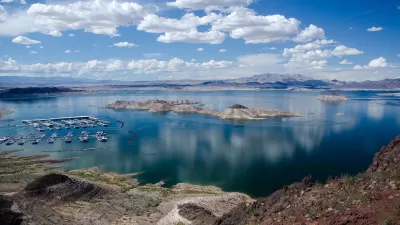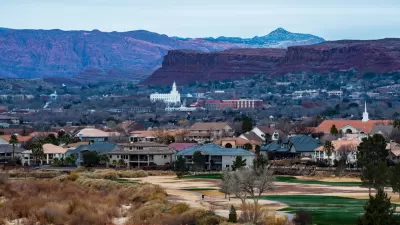As water supplies around the West dwindle, one Utah county is moving ahead with plans for a new Colorado River pipeline.

Amidst historic drought conditions and dramatically low reservoirs across the West, Washington County, Utah wants to forge ahead with a proposed water pipeline, reports Jeremy P. Jacobs. "The proposed Lake Powell Pipeline, a 140-mile straw from one of the country’s largest reservoirs to Washington County in southwestern Utah, has sparked backlash from other states in the Colorado River basin and environmentalists, and now has the Biden administration in a difficult position."
Drought conditions "are particularly acute on the Colorado River, which has suffered through a more-than-20-year megadrought. The river feeds 40 million people and millions of acres of cropland." The pipeline project relies on the Colorado River’s 1922 compact, which "allocated about 23% of the Upper Basin’s water to Utah, and the state uses about 72% of that water. The pipeline would help it tap another 86,000 acre-feet of water before it flows downstream to the lower basin." County officials call the pipeline a "key to [the] long-term water future," but critics argue the affected states can't build their way out of the current crisis. "Washington County’s population of about 200,000 is continuing to grow. But critics note that with its multiple green golf courses, it has higher per-capita water use than many of its western neighbors, including Las Vegas, Denver, Los Angeles, Tucson and Phoenix."
Eric Kuhn, the author and former general manager of the Colorado River District, knows there's more at stake. "[T]he pipeline is just one move in a complicated game as the basin states begin negotiating new river operations due in 2026."
FULL STORY: As the West bakes, Utah forges ahead with water pipeline

Alabama: Trump Terminates Settlements for Black Communities Harmed By Raw Sewage
Trump deemed the landmark civil rights agreement “illegal DEI and environmental justice policy.”

Study: Maui’s Plan to Convert Vacation Rentals to Long-Term Housing Could Cause Nearly $1 Billion Economic Loss
The plan would reduce visitor accommodation by 25% resulting in 1,900 jobs lost.

Why Should We Subsidize Public Transportation?
Many public transit agencies face financial stress due to rising costs, declining fare revenue, and declining subsidies. Transit advocates must provide a strong business case for increasing public transit funding.

Wind Energy on the Rise Despite Federal Policy Reversal
The Trump administration is revoking federal support for renewable energy, but demand for new projects continues unabated.

Passengers Flock to Caltrain After Electrification
The new electric trains are running faster and more reliably, leading to strong ridership growth on the Bay Area rail system.

Texas Churches Rally Behind ‘Yes in God’s Back Yard’ Legislation
Religious leaders want the state to reduce zoning regulations to streamline leasing church-owned land to housing developers.
Urban Design for Planners 1: Software Tools
This six-course series explores essential urban design concepts using open source software and equips planners with the tools they need to participate fully in the urban design process.
Planning for Universal Design
Learn the tools for implementing Universal Design in planning regulations.
Caltrans
Smith Gee Studio
Institute for Housing and Urban Development Studies (IHS)
City of Grandview
Harvard GSD Executive Education
Toledo-Lucas County Plan Commissions
Salt Lake City
NYU Wagner Graduate School of Public Service





























